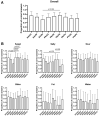TAS1R3 and TAS2R38 Polymorphisms Affect Sweet Taste Perception: An Observational Study on Healthy and Obese Subjects
- PMID: 35565677
- PMCID: PMC9101038
- DOI: 10.3390/nu14091711
TAS1R3 and TAS2R38 Polymorphisms Affect Sweet Taste Perception: An Observational Study on Healthy and Obese Subjects
Abstract
Background: The inter-individual differences in taste perception find a possible rationale in genetic variations. We verified whether the presence of four different single nucleotide polymorphisms (SNPs) in genes encoding for bitter (TAS2R38; 145G > C; 785T > C) and sweet (TAS1R3; −1572C > T; −1266C > T) taste receptors influenced the recognition of the basic tastes. Furthermore, we tested if the allelic distribution of such SNPs varied according to BMI and whether the associations between SNPs and taste recognition were influenced by the presence of overweight/obesity. Methods: DNA of 85 overweight/obese patients and 57 normal weight volunteers was used to investigate the SNPs. For the taste test, filter paper strips were applied. Each of the basic tastes (sweet, sour, salty, bitter) plus pure rapeseed oil, and water were tested. Results: Individuals carrying the AV/AV diplotype of the TAS2R38 gene (A49P G/G and V262 T/T) were less sensitive to sweet taste recognition. These alterations remained significant after adjustment for gender and BMI. Moreover, a significant decrease in overall taste recognition associated with BMI and age was found. There was no significant difference in allelic distribution for the investigated polymorphisms between normal and overweight/obese patients. Conclusions: Our findings suggest that overall taste recognition depends on age and BMI. In the total population, the inter-individual ability to identify the sweet taste at different concentrations was related to the presence of at least one genetic variant for the bitter receptor gene but not to the BMI.
Keywords: eating behavior; obesity; single nucleotide polymorphisms; taste identification; taste receptors.
Conflict of interest statement
The authors declare no conflict of interest.
Figures


References
Publication types
MeSH terms
Substances
LinkOut - more resources
Full Text Sources
Medical
Molecular Biology Databases

